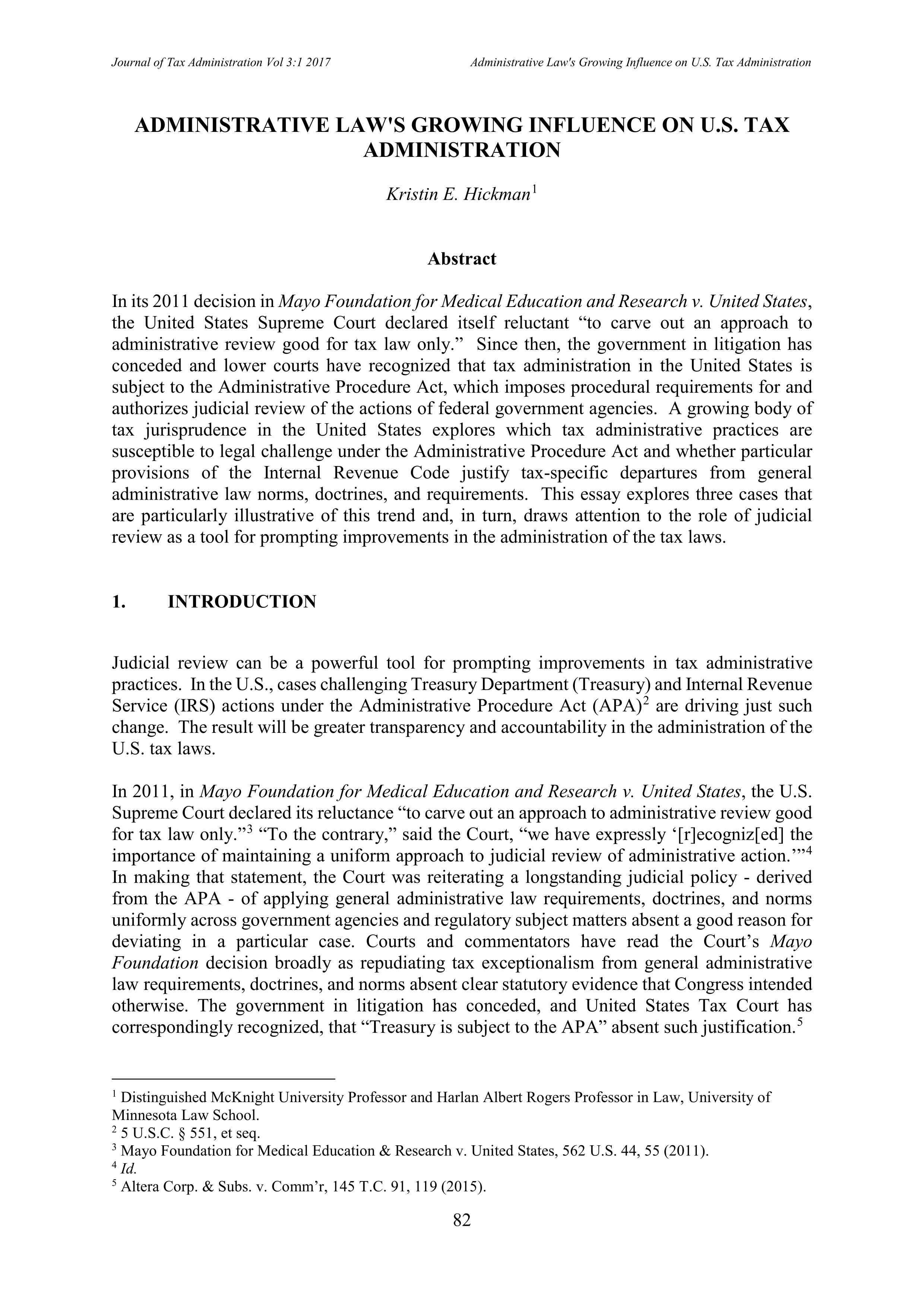Administrative Law's Growing Influence on U.S. Tax Administration
Abstract
In its 2011 decision in Mayo Foundation for Medical Education and Research v. United States, the United States Supreme Court declared itself reluctant “to carve out an approach to administrative review good for tax law only.” Since then, the government in litigation has conceded and lower courts have recognized that tax administration in the United States is subject to the Administrative Procedure Act, which imposes procedural requirements for and authorizes judicial review of the actions of federal government agencies. A growing body of tax jurisprudence in the United States explores which tax administrative practices are susceptible to legal challenge under the Administrative Procedure Act and whether particular provisions of the Internal Revenue Code justify tax-specific departures from general administrative law norms, doctrines, and requirements. This essay explores three cases that are particularly illustrative of this trend and, in turn, draws attention to the role of judicial review as a tool for prompting improvements in the administration of the tax laws.
References
“3M Co. Argues IRS Can’t Allocate Royalties from Brazil Subsidiary” (2016, March 21). Tax Analysts: Tax Notes Today.
Asimow, M. (1991). Public Participation in the Adoption of Temporary Treasury Regulations. Tax Lawyer, 44(2), 343.
“Business Associations Ask Court to Invalidate Inversion Rule” (2016, October 11). Tax Analysts: Tax Notes Today.
“Estate Tax Regs May Exceed Treasury’s Authority, Bar Group Says” (2016, November 28). Tax Analysts: Tax Notes Today.
Forman, J. B. (1992). Let’s Keep (and Expand Upon) the Earned Income Credit. Tax Analysts: Tax Notes, July 13, 233.
Hawley, E. M. (2014). The Equitable Anti-Injunction Act. Notre Dame Law Review, 90(1), 81.
Kafka, G. A., & Cavanagh, R. A. (1995). Litigation of Federal Civil Tax Controversies 2d ed. (§ 1.01). Warren, Gorham & Lamont.
Khang, L. (2013). The IRS Tea Party Controversy and Administrative Discretion. Cornell Law Review Online, 99, 41.
Hickman, K. E., (2014). Administering the Tax System We Have. Duke Law Journal 63(8), 1717.
Hickman, K. E. (2007). Coloring Outside the Lines, Examining Treasury’s (Lack of) Compliance with Administrative Procedure Act Rulemaking Requirements. Notre Dame Law Review, 82(5), 1727.
Hickman, K. E. (2016). Pursuing A Single Mission (Or Something Closer To It) For The IRS. Columbia Journal of Tax Law, 7(1), 169.
Hickman, K. E. & Kerska, G. (2017). Restoring the Lost Anti-Injunction Act. Virginia Law Review, 103 (forthcoming).
Pierce, R. J., Jr., (2010). Administrative Law Treatise 5th ed. (§ 15.4). Wolters Kluwer.
Smith, P. J. (2012). The APA’s Arbitrary and Capricious Standard and IRS Regulations. Tax Analysts: Tax Notes, July 16, 271.

Downloads
Published
How to Cite
Issue
Section
License
Copyright (c) 2017 Kristin E. Hickman

This work is licensed under a Creative Commons Attribution 4.0 International License.
Our open access status means that authors retain the copyright of their work. However, all papers published in JOTA are done so under a Creative Commons Attribution 4.0 International license (CC BY). This means that others can share and/or adapt your work without your permission as long as they follow certain rules, including attributing your work correctly.
You can learn more about this on our Open Access, Licensing, and Copyright Policies page.



